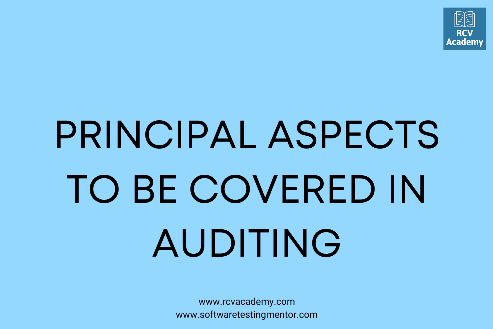In this tutorial, we will learn about principal aspects to be covered in auditing. The auditor must check the arithmetical accuracy of the books of accounts by checking the proper posting.
The following aspects are required to be covered by an auditor while doing audits of any organization. The principle issues can also call as the function of auditing, and they are as follows:
Review Of System And Procedures:
A review of system and procedures is the primary function of auditing exercise. First, an auditor needs to understand the policy and processes adopted by the entity to further audit it.
Review Of Internal Control System:
A review of the internal control system is very important for the auditor. The internal control system’s effectiveness will determine the extent of checking to be done by the auditor. The compliance test and the substantive procedures performed by the auditor will evaluate the effectiveness of the internal control system. If the internal control system is effective, less checking is required, and vice versa.
An auditor needs to comment on the effectiveness of the internal control system in the organization, so the internal control review is necessary for carrying out the auditing exercise.
Routine Checking Or Arithmetical Accuracy:
The auditor must check the arithmetical accuracy of the books of accounts by reviewing the books’ proper post and balances accounts.
Accounting Principles:
Auditor has to ascertain whether proper distinction has been made between the item of capital and revenue nature and also whether the issue of income and expenditure of a particular period has adjusted in the books of accounts of that accounting period.
Books And Statements:
Auditor has to compare the balance sheet and the profit and loss accounts or other statements with the books of accounts and supporting vouchers to ascertain that the underlying records have made the final reports.
Verification Of Assets:
The auditor must physically inspect the assets and their recording in the books of accounts and verify the legal and official documents to ascertain the existence, obligation, completeness, valuation, and disclosures of an entity’s liabilities.
Accurate And Fair View:
The auditor has to decide whether the financial statement depicts the organization’s accurate and fair view of the state of affairs.
Statutory Compliance:
Auditor has to ensure that all the regulatory requirements have been compiled by the entity like provisions of the income tax act and other acts if the organization has compiled applicable.
Vouching:
Auditor has to inspect documentary evidence that supports and substantiates a transaction.
Reporting:
The auditor has to say to the authority appointing him for conducting audit whether financial statements of accounts examined reveal an accurate and fair view of the state of affairs and the profit and loss earned during the organization’s period.
